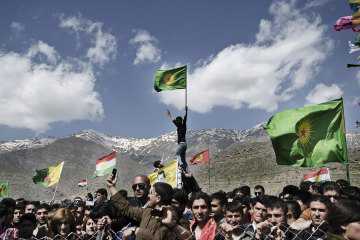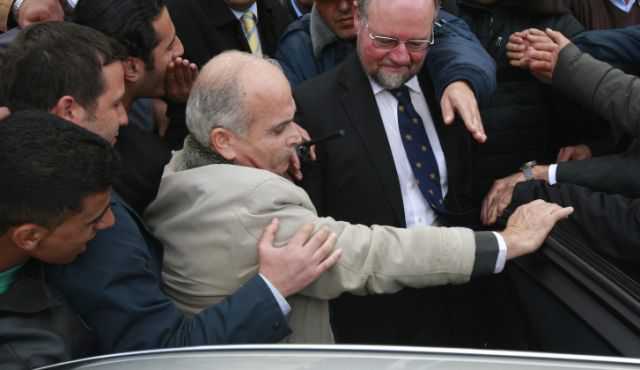Turkish Prime Minister Recep Tayyip Erdogan is in trouble again with Washington and Tel Aviv because he dared to equate Zionism with fascism and anti-Semitism as an ideology or political movement that has brought oppression. Erdogan was speaking at a United Nations sponsored Alliance of Civilizations conference in Vienna dealing with instilling tolerance. He spoke in Turkish, but his words as translated into English were, “It is necessary that we must consider – just like Zionism or anti-Semitism or fascism – Islamophobia is a crime against humanity.” Erdogan was immediately pounced upon by the usual suspects and new American Secretary of State John Kerry was also quick to pull the trigger by saying, “We not only disagree with it. We found it objectionable.” He also stated that the comments did not help the Israel-Palestine peace process. That there is no peace process due to Israel’s unwillingness to countenance an actual Palestinian state with genuine sovereignty is apparently irrelevant, but then again it has been irrelevant to American policymakers ever since 1967, when the Israelis first occupied the remaining land that they had not already taken in the aftermath of the 1947 partition of Palestine.
Turkish Foreign Minister Ahmet Davutoglu spoke afterwards with Kerry and disagreed, observing that in 2010 Israel had attacked a Turkish flagged vessel in international waters and killed nine Turkish citizens who were seeking to deliver humanitarian aid to Gaza. He noted that “If Israel wants to hear positive statements from Turkey it needs to reconsider its attitude both towards us and towards the West Bank.”
Erdogan and Davutoglu were referring to how political Zionism has denied fundamental human rights to the Palestinians that it displaced by force starting at the time of partition and continuing to the present. Neither contested the right of the Jewish people to have a homeland, but were simply pointing out that Zionism as it has been practiced has caused considerable human suffering, just as fascism and anti-Semitism have done in other places and at other times. Historically speaking, some Zionists believed that Jews should return to Biblical Israel by purchasing land and would learn to live alongside their Arab neighbors while others argued, that the Arabs would have to be removed. In the event, the latter view has prevailed. One would think that the egregious and well documented Israeli human rights violations inflicted on the Palestinians would be obvious to everyone, even in Washington, and that there might even be some cautiously expressed understanding of what lay behind the Turkish Prime Minister’s remarks. But that was perhaps inevitably not the case and a goodly part of the U.S. media and chattering class quickly expressed their outrage.
Erdogan has long been one of the preferred targets of neocon rage. The Turkish prime minister dared confront Israel’s President Shimon Peres at an international meeting in Davos in January 2009. Referring to the slaughter of Gazan civilians earlier that month, Erdogan told Peres “…you know well how to kill.” The sharp exchange exemplified Israel’s richly deserved public relations problem. The coverage of the Erdogan-Peres exchange was carefully managed in the U.S. media, but somewhat more unrestrained in Europe and the Middle East. In the one hour discussion of Gaza that was moderated by David Ignatius of The Washington Post, a far from impartial participant, Peres was allowed twenty-five minutes to speak in defense of the Israeli attack. Erdogan was given twelve minutes. During the debate, Peres pointed accusingly at Erdogan and raising his voice. When Erdogan sought time to respond, Ignatius granted him a minute and then cut him off claiming it was time to go to dinner. Erdogan complained about the treatment and left Davos, vowing never to return. Back in Turkey, he received a hero’s welcome.
Over at Commentary magazine, the American Enterprise Institute’s Michael Rubin led the charge against Erdogan’s most recent comments, writing that, “…when they argue for the criminalization of Islamophobia, Erdogan and his fellow traveler seek to ban…criticism of the more radical outliers of radical Islamism.” It is interesting that Rubin is able to interpret what Erdogan was thinking, but he then adds a clincher: under Erdogan, “the murder rate of women has increased 1,400 per cent,” suggesting somehow that the Turkish government is responsible. And there is more. Rubin asserts that Erdogan doesn’t like press freedom with Turkey ranking 154 among nations, just behind Mexico (it might be noted that Israel ranks 112, after Panama, while the United States is 32).
Joining the attack, David Goldman, a former leftist and Lyndon LaRouche cultist who has now turned conservative, wrote that, “Lunatics have run better countries that Turkey in living memory” before going off on a tangent to tell how people in Anatolia believe in black magic. He also added that Erdogan has a “bizarre edge” since he believes that Turks living in Europe should not assimilate, that they should retain their culture and Turkish identity. Rod Dreher in a piece entitled “Turkey under Islamist Rule” then piled on the scrum by quoting Goldman and Rubin at length before adding that “Turkey is one of the region’s worst violators of religious freedom…Turkey is a great country, but it is not part of the west, and absent a tremendous change, mustn’t be allowed to be.”
Even assuming that all the assertions made by Goldman, Rubin and Dreher are true, what do the media, murder statistics, Islamophobia, witchcraft, the European Union, and religious freedom have to do with whether Erdogan was right or wrong about Zionism? Nothing, and the essentially ad hominem arguments themselves reveal along the way considerable ignorance about contemporary Turkey and the Turkish people, a condition that has never caused a single neoconservative to falter one bit. The fact is that it is Zionism that has created the intellectual and political framework for the continuing dispossession of the Palestinian people. Rubin argues that, “to be anti-Zionist…is to believe that Israel should cease to exist.” Well, that is a convenient way to put it, but it is just not so. Israel exists and thanks to U.S. aid is the regional military hegemon. Turkey and most other majority Islamic countries recognize that reality and have understood it for years. Turkey also has a good record towards its Jewish minority. The Ottomans took in Sephardic Jews expelled from Spain in 1492 and the community has prospered since that time. Ankara in was in fact a close friend to Israel prior to the killing of its citizens and there have been reports that behind the scenes the two countries continue to cooperate.
Mustafa Kemal Ataturk, founder of modern Turkey, believed that Islam had held his country back so he insisted on a state in which religion had no part, even adopting the Latin alphabet to replace the Quranic Arabic script that Turkish had hitherto employed. That view persists and Kemalist well-educated Turks, of which I know many, tend not to be religious or are even hostile to religion. They include most journalists, academics, businessmen, and army officers. They are capable of considerable pushback in the Turkish political system, note for example the headscarf in schools controversy, to include active and quite effective opposition political parties. The contention that Turkey is somehow “Islamist” ruled promoted by Dreher and others is misleading at a minimum. The fact is, most Turks are nominally Muslim and most rural Turks have always been devout. Now, for the first time since the 1930s Anatolian peasants as well as other Turks from a more secular background are able to express freely their religiosity, which might be assumed by Rubin, Goldman, and Dreher to be a change for the better if it were any religion but Islam. Most observers who actually know anything about Turkey and are not engaging in taking cheap shots regard Erdogan and his Justice and Development Party (AKP) as both moderate and considerably less corrupt than its predecessors.
Ataturk also sought to create from the remains of the polyglot and multi-cultural Ottoman Empire a Turkish national identity. That meant that laws were passed defining Turkishness, laws that have generated periodic conflicts with Kurdish, Alevi, and Christian minorities and have led to the suppression of separate cultures and, more particularly, languages. This has produced the Kurdish problem, involving Turkey’s largest minority, which has bedeviled the country for nearly thirty years. Erdogan’s liberalization of laws to permit more Kurdish autonomy have clashed with the problem of the nation’s Turkish identify and run up against cultural and legal barriers, particularly at local levels. The Kurdish problem, which is a national security issue due to the activity of the terrorist group PKK, has also created the press freedom infringements identified by Rubin. Most journalists who have been punished by the government are Kurds who have fallen afoul of the Turkishness and counter-terrorism laws, which suggests a much more complicated dynamic than Rubin would admit to. Kurdish issues aside, the Turkish media is vibrant and not afraid to criticize the government.
Goldman’s assertion about Erdogan’s desire to have ethnic Turks retain their identity is completely off base. The Prime Minister was responding to a German law requiring Turkish children born in Germany to select either German or Turkish nationality by the time they reach age 23. Erdogan was, not surprisingly, urging them to retain their Turkish identity. And as for Dreher’s meaningless assertion that Turkey is not part of the west or “mustn’t be allowed to be,” much depends on how one defines the west these days. Is it cultural, religious, ethnic, racial, geographic or none of the above? If it is values how does one accept a Christian Greece that is awash in institutional and personal corruption versus a Muslim Turkey that scores much better on those issues? And what about the various kleptocracies operating in the Balkans? Dreher suggests that Islam means that Turkey must be kept out of the European Union club, a not uncommon viewpoint but one that is essentially bogus if one examines the successful assimilation of Muslims in our own United States, for example. It is also curious that Dreher and the others do not seem to have ever objected to the oppression of Christians and Muslims alike in Israel, where religion based property seizures and official unwillingness to provide building permits, not unlike incidents occurring in Turkey, happen frequently. Christian clergy are also regularly spat upon by Israeli Jews, suggesting an even higher level of animosity on a personal level which does not seem to bother Rubin, Goldman, and Dreher.
I confess that I am defending Turkey partly because I have lived there, speak Turkish, and like the country and its people. It is also a major strategic ally of the United States, which is not true of Israel. Yes, there are many things that could be improved in Turkey but the same could be said in spades about our own country. Indeed, one might reasonably argue that Turkey is becoming more democratic while the United States is becoming less so. But when Prime Minister Erdogan says something that is manifestly true that some find offensive it perhaps would not be churlish to suggest that the critics stick to the actual comments for their rebuttals. I suppose the redirection of the argument is due to the fact that it is very difficult to defend Zionism as it has been practiced in Israel but it would be nice for a change if folks like Rubin, Goldman, and Dreher would somehow figure out that the rest of the world does not necessarily accept the various fictions that have been concocted to justify Israel’s oppression of the Palestinians.
 HAWRE MUHAMED / METROGRAPHY
HAWRE MUHAMED / METROGRAPHY



